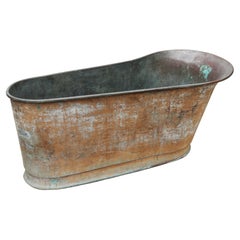Copper Reclaimed Bateau Bath
Recent Sales
Antique 19th Century Architectural Elements
Copper
Materials: copper Furniture
From cupolas to cookware and fine art to filaments, copper metal has been used in so many ways since prehistoric times. Today, antique, new and vintage copper coffee tables, mirrors, lamps and other furniture and decor can bring a warm metallic flourish to interiors of any kind.
In years spanning 8,700 BC (the time of the first-known copper pendant) until roughly 3,700 BC, it may have been the only metal people knew how to manipulate.
Valuable deposits of copper were first extracted on the Mediterranean island of Cyprus around 4,000 BC — well before Europe’s actual Bronze Age (copper + tin = bronze). Tiny Cyprus is even credited with supplying all of Egypt and the Near East with copper for the production of sophisticated currency, weaponry, jewelry and decorative items.
In the 15th, 16th and 17th centuries, master painters such as Leonardo da Vinci, El Greco, Rembrandt and Jan Brueghel created fine works on copper. (Back then, copper-based pigments, too, were all the rage.) By the late 19th and early 20th centuries, decorative items like bas-relief plaques, trays and jewelry produced during the Art Deco, Arts and Crafts and Art Nouveau periods espoused copper. These became highly valuable and collectible pieces and remain so today.
Copper’s beauty, malleability, conductivity and versatility make it perhaps the most coveted nonprecious metal in existence. In interiors, polished copper begets an understated luxuriousness, and its reflectivity casts bright, golden and earthy warmth seldom realized in brass or bronze. (Just ask Tom Dixon.)
Outdoors, its most celebrated attribute — the verdigris patina it slowly develops from exposure to oxygen and other elements — isn’t the only hue it takes. Architects often refer to shades of copper as russet, ebony, plum and even chocolate brown. And Frank Lloyd Wright, Renzo Piano and Michael Graves have each used copper in their building projects.
Find antique, new and vintage copper furniture and decorative objects on 1stDibs.
Finding the Right building-garden for You
Choosing the right antique or vintage building and garden elements can prove pivotal when you’re working to beautify any room in your home or just put the finishing touches on a garden or other outdoor area.
It takes time and effort to improve your outdoor space or merely to bring an air of tranquility to an indoor area set aside for private relaxation or gathering with friends. The good news is that 1stDibs can help.
To introduce a sense of timelessness to a back patio or interior common area, choose cast-stone statues or sculptural busts for a dose of drama or select ornate architectural elements such as corbels, plaques or panels made of marble or iron. Elsewhere, find a focal point in your living room and create a “feature wall” by bringing pops of color into a corner with handmade antique ceramic tiles.
It helps when design changes like these have a practical upside too.
Victorian cast-iron stair treads hearken back to a time when adding decorative details to your property was a priority. While lending an attractive appearance to an exterior staircase, these safeguards render the steps slip-resistant for those coming and going. And as one good stylistic choice usually leads to another, pairing your sophisticated treads with a coupling of 19th-century hand-forged andirons would be a thoughtful, durable touch for any courtyard or comfortable lounge space, be they intended for an indoor fireplace or a patio firepit.
Where the garden is concerned, any sophisticated garden ornaments you select should work with nature, not against it. Wrought-iron garden gates will simply refuse to be relegated to the background. Instead, they’ll draw attention to your painstakingly sculpted hedges and colorful flora. When paired with a sparse arrangement of other tasteful additions, such as a stone planter, garden stool or other welcoming pieces of outdoor seating, the effect can be transformative.
On 1stDibs, find a sprawling collection of antique garden furniture and architectural elements that meet every need. Our offerings include everything from sculptural bathroom fixtures to flooring ideas to pedestals and columns designed in a variety of styles and much more.
Read More
This Lavish 18th-Century Chimneypiece Comes from a Historic Scottish Estate
The exceptionally crafted mantel was saved despite the home’s regrettable demise.
A Pair of Monumental Stone Tigers Protect and Guide Wandering Souls
The Qing dynasty beasts honored the dead and warned off malicious spirits.
Andrés Monnier’s Stone Tub Makes Bathing a Rite of Renewal
The dramatic piece transforms a daily scrub into an act of communion with the elements.
Meet the Siblings behind the Exquisite Outdoor Furniture of McKinnon and Harris
Anne and Will Massie apply the lessons of the past to create alfresco pieces as timeless as the traditions that inspire them.
35 Wondrous Outdoor Dining Spaces
Eating meals alfresco is one of the great pleasures of warm weather, and a beautifully appointed space only heightens the experience. Get inspired by these delectable dining areas as you think about creating your own outdoor oasis.
In These Chic Homes, Indoors and Outdoors Freely Mingle
Through potted plants, garden furniture, nature-inspired art and architectural apertures, designers are bringing the outside in.
24 Perfect Patios with Fire Pits and Fireplaces
In these stylish spaces, the outdoor season extends year round.
40 Spectacular Spaces Warmed by Fireplaces
As the days grow colder, the desire to gather around the fire grows stronger. Take a peek at these well-appointed rooms featuring extraordinary sculptural and historic fireplaces.
